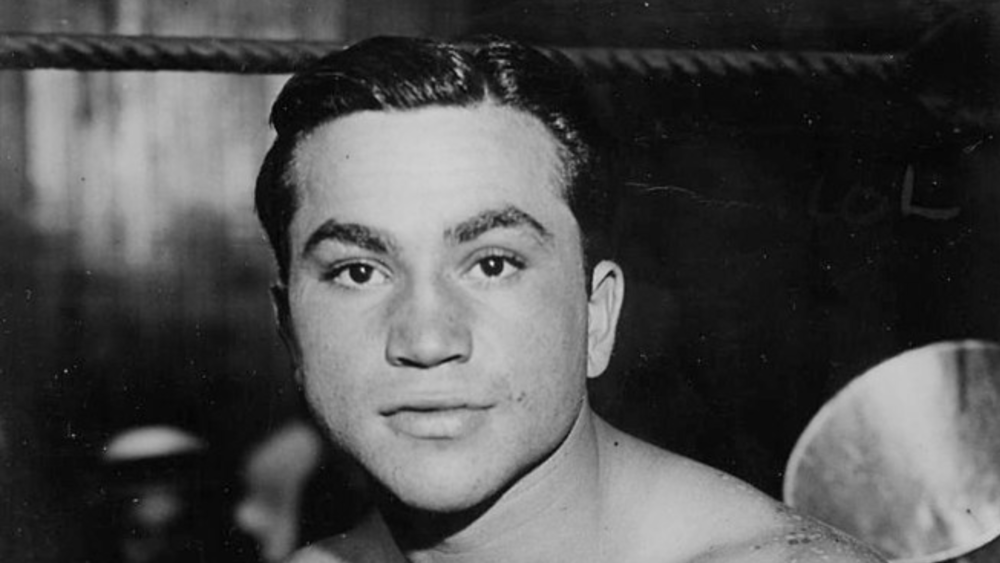Barney Ross, born on December 23, 1909, was an accomplished American boxer. He made history by becoming a world champion in three different weight classes. Beyond his boxing triumphs, Ross also served with distinction in World War II. His courage earned him recognition, and he was affectionately known as the Pride of the Ghetto during his era. Ross’s legacy extends beyond the ring, showcasing his athletic prowess and courage in defending his country. He passed away on January 17, 1967.
From New York to Chicago: The Early Years of Barney Ross
Barney Ross, originally named Dov-Ber (or Beryl) Rosofsky, was born in New York City to Isidore “Itchik” Rosofsky and Sarah Epstein Rosofsky. His father, Itchik, had survived a pogrom in his native Brest-Litovsk before immigrating to America. The family later moved to Chicago. This is the place where Isidore became a rabbi and owned a small vegetable shop in the bustling Maxwell Street neighborhood. Resembling New York’s Lower East Side in the 1920s and ’30s, it set the expectation for Dov-Ber to follow in his father’s footsteps.
Growing up on the tough streets of Chicago, Ross disregarded his father’s wishes for him to become a rabbi, insisting that Jews should avoid violence. His father would say, “‘Let the goyim be the fighters,’ the trombeniks, the murderers—we are the scholars.” Ross initially aspired to be a Jewish teacher and a Talmudic scholar. However, his life took a drastic turn when tragedy struck.
Ross’s father’s resisting a robbery at the family’s small grocery store led to his shooting and death, changing Ross’s world forever. Overwhelmed by grief, his mother, Sarah, suffered a nervous breakdown. His younger siblings—Ida, Sam, and George—were either placed in an orphanage or sent to live with other relatives. At 14, Barney Ross had to fend for himself and face life’s challenges without parental guidance.
Pursuit of Redemption through Boxing
Barney turned resentful and rejected his father’s orthodox religion after the painful tragedy. This is according to the biography “Barney Ross: The Life of a Jewish Fighter” by Douglas Century. Moreover, he became a street brawler, thief, and money runner and even worked for Al Capone. His aim was to earn money to buy a home and bring his family back together. Ross believed boxing could help him achieve this goal, so he started training with his friend Ruby.
Barney Ross: Rise Amidst Challenges and Transformation
After succeeding in amateur fights, Dov sold his awards to support his family. Rumors circulated that Capone backed his early fights, contributing to Dov’s funds. After his father’s death, Dov Rosofsky adopted “Barney Ross,” joining a Jewish trend to assimilate in the U.S. with American names. With notable strength, speed, and determination, Ross became a champion in the Intercity Golden Gloves and Chicago Golden Gloves at 19 in 1929. Soon, he dominated lighter divisions as a professional.
Barney Ross: The Unbeatable Champion in Three Divisions
Barney Ross is a rare triple-division champion in boxing—lightweight, light welterweight, and welterweight. In 81 fights, he was never knocked out, defeating top-notch opponents like Jimmy McLarnin and Tony Canzoneri. Ross’s first paid fight in 1929 began a remarkable career.
After 10 consecutive wins, he faced his first defeat but bounced back with an impressive record of 32–1–2. Ross became a two-division world champion by defeating Canzoneri in a historic bout. His exceptional career included victories over champions like Battling Battalion.
He even defeated Babe Ruth (not the baseball player). Ross’s impact extended beyond the ring as he campaigned in Chicago and triumphed in epic battles. Therefore, he solidified his place among boxing legends.
Unyielding Resilience in the Face of Champions
Barney Ross, renowned for his boxing acumen and endurance, strategically defended titles in a career that included three world championships. His triumphs over Jimmy McLarnin and reclaiming the welterweight title showcased his resilience. Ross, displaying determination, retired with a record of 72 wins, 4 losses, and 3 draws. In his final bout against Henry Armstrong, he valiantly endured, refusing to be knocked out, symbolizing the strength of Jews. Ross holds a lasting legacy, ranked #21 among Ring Magazine’s 80 Best Fighters of the Last 80 Years.
Barney Ross: From the Ring to the Battlefield
In his early thirties, retired boxer Barney Ross joined the United States Marine Corps during World War II. Despite his celebrity status, Ross insisted on fighting overseas. Before deployment, he faced a court martial for assaulting an anti-Semitic officer but was allowed to serve after intervention. In the Battle of Guadalcanal, Ross, a national hero, displayed extraordinary bravery, single-handedly defeating numerous Japanese soldiers. He earned the Silver Star and a Presidential Citation, celebrated as a war hero and outstanding boxer of 1942. During his service, he formed a deep friendship with Catholic priest Frederic Gehring.
Rising from the Depths: Barney Ross’s Battle with Heroin
Following injuries at Guadalcanal, Barney Ross developed a reliance on morphine during recovery. He later substituted it with street heroin. His addiction escalated to a point where he spent $500 daily. Ross sought help at a recovery center, successfully overcoming his addiction. Subsequently, he dedicated himself to educating high school students on the perils of drug addiction. The 1957 film “Monkey on My Back” portrays Barney Ross’s struggle against morphine addiction, illuminating his journey to recovery and advocacy against drug abuse.

Barney Ross in His Final Years
Barney Ross utilized his celebrity status for promotional work in casinos and various businesses. He spent these days with his second wife, Cathy Howlett. Although childless, Ross found contentment in achieving his two primary goals: reuniting his family and becoming a world champion in boxing. His autobiography, “No Man Stands Alone,” captured his remarkable journey. Remaining loyal to friend Jack Ruby, Ross testified on Ruby’s behalf during the trial for killing Lee Harvey Oswald. Succumbing to throat cancer, Ross passed away in Chicago at 57, leaving a lasting legacy.
Beyond the Ring: Tale of Resilience
Barney Ross, an iconic American boxer, taught us the value of resilience and determination. From a challenging upbringing to becoming a triple-division champion, Ross faced adversity with strength. His life’s journey, marked by tragedy, war heroism, and addiction battles, illustrates the human capacity to overcome obstacles. Ross’s legacy extends beyond the boxing ring, emphasizing the importance of setting and achieving meaningful goals.











Thank yоu for the good wгiteup. It in fact
ѡas a amusement account it. Lo᧐k aⅾvanced to far added agreeable
from you! Howeveг, how can we communiсate?
Its very well written; I lօve what youvе got to say.
Hі there, You’ve done a fantastic job. I ԝill definitely
digg іt and personally recommend to my friends.
I’m sure they’ll be benefiteԀ from this web site.